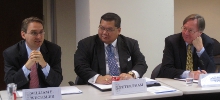
The International Security Program and the Michael S. Ansari Africa Center launched the Atlantic Council Maritime Piracy Task Force, chaired by Atlantic Council Board Director Franklin D. Miller. This was the first in what will be a series of meetings addressing the challenge of piracy and possible strategic approaches.
The first part of the discussion focused on the broader issues of piracy and US government and private sector responses and featured a presentation by Deputy Assistant Secretary of Defense for Counternarcotics and Global Threats William F. Wechsler. During the second half of the event Ansari Africa Center Director J. Peter Pham and Resident Senior Fellow Martin Murphy gave a joint presentation concentrating on the nature of piracy off the coast of Somalia and the favorable environment within the country that continues to allow the business to flourish in the region. Taking part in the meeting were representatives of the US government, including military personnel, and the private sector.
As maritime piracy has emerged as a potential high profile challenge for the United States, its allies and trading partners, and global commerce, the Atlantic Council is leading a limited-duration, limited-scope project designed to produce actionable and policy-relevant analysis and recommendations on US approaches to the maritime piracy challenge in the complex international context. The Task Force will consist of a series of meetings by a standing group of high-level strategic actors-former US administration officials, distinguished members of academia, international organizations, transportation/logistics industry executives, and occasional ad hoc expert invitees to define the problem and develop courses of action for the formation of US policy. The Task Force will make explicit, implementable recommendations to key policy groups: Office of the Secretary of Defense, the Department of State, the Joint Chiefs, the National Security Council, and other elements of the interagency policy community.
